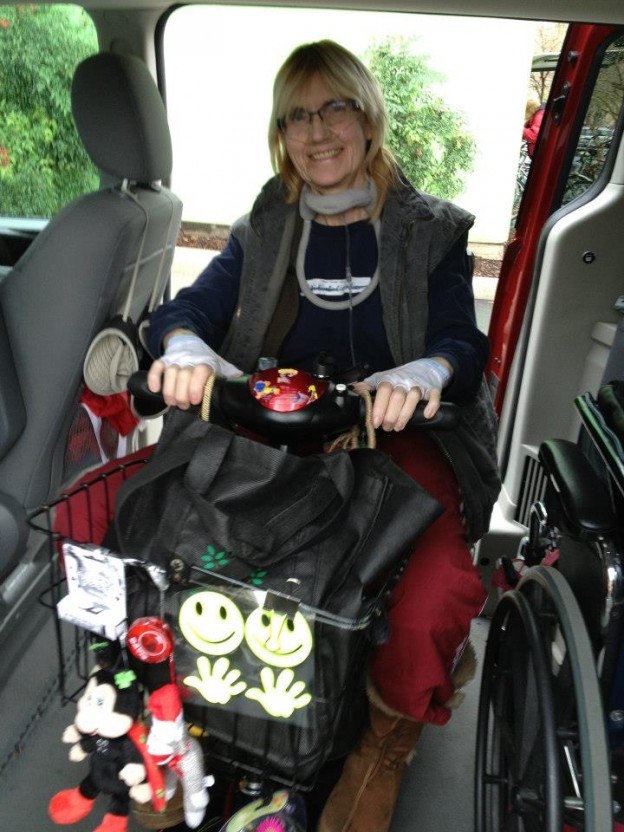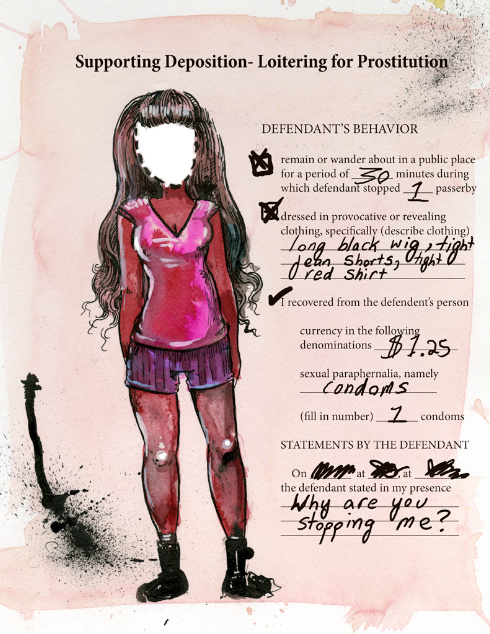LGBTQ-logue 004.
I’m a tangible poster child for why DOMA should be repealed. If someone asks what’s unfair about our marriage not being recognized in all states, I can offer several examples, but here is the most glaring one: I’m dying. I have a terminal illness and I pretty much know my life span. My wife and I have been together since 1993, and we’re legally married in the state of California, yet the federal government does not recognize our marriage and the rights included therein.- Cathy, written testimony submitted before the Committee on the Judiciary, Respect for Marriage Act, July 20 2011.
Important markers in US human rights history this week! Hillary Clinton formally endorses marriage equality and next week the Supreme Court makes a decision on the repeal of the discriminatory Defense of Marriage Act. For our weekly LGBTQlogue Initiative, we look back at beginning stages to repeal DOMA through the testimony of Cathy.

Cathy and her wife have been together for twenty years. Cathy is dying from Lou Gehrig’s disease with a life expectancy of one to five years. Because the federal government does not recognize their marriage, Cathy’s wife will not receive her social security survivor benefits after she passes away. Instead, Cathy’s social security will go to the government. In her written testimony for the Committee on the Judiciary of the Respect for Marriage Act, Cathy explains how DOMA denies her family basic rights and stability that come with federal recognition of marriage. Cathy hopes to live long enough to see DOMA nullified.
In January 2009, I was diagnosed with Amyotrophic Lateral Sclerosis (ALS) a.k.a. Lou Gehrig’s disease. This is a progressive, fatal neuromuscular disease. Most people with ALS die 2 to 5 years after diagnosis….I have a powerful incentive to live long enough to see the federal government recognize our marriage. Without this recognition, my wife will not receive my social security benefits.
I met my wife in 1993 and we had our first unofficial wedding celebration on June 16, 2001. In February of 2004, we were one of thousands of couples who got married in San Francisco City Hall after Gavin Newsom honored our rights to marry. We had to travel three times to San Francisco in attempts get our marriage license because we weren’t allowed to schedule appointments as is done for heterosexuals. With thousands of other couples, we had to line up for blocks in rain, fog, cold, and wind for up to thirteen hours each trip. Our determination and steadfast love prevailed. The fourth time, we, like other couples, were allowed to schedule appointments and receive our marriage license. We exchanged vows immediately after in the glory of the S.F. City Hall rotunda. We framed our marriage license from the County of San Francisco, which the courts later nullified.
Again we did not give up. We were one of the 18,000 gay couples who did get married legally in California before California’s Proposition 8 put an end to gay marriages in the state. Our marriage is still considered valid in California, so we do have the same rights as any married couple in California.
However, when we step out of California, or deal with federal laws, we have none of those rights. This means if my wife and I travel out of state and my ALS requires a trip to the emergency room or a hospital stay, my wife could be denied the right to be with me at a time when I could be breathing my last breath.
When I die, [my wife] will not get my social security benefits. For heterosexual couples all over the country, when a person dies, their spouse gets their social security benefits. You get a monthly stipend because you’ve been paying into social security all your working life. You then draw off that money after you retire and if you die, it goes to your spouse or your dependent.
However, since the federal government does not recognize our marriage, [my wife] won’t get that. All the money I would have gotten to help support us if I were to grow older just goes back to the government. [My wife] can’t have it.
I contacted attorneys to see if there was anything I could do. They told me that, in the eyes of the federal government, I have no spouse. A few friends suggested that I legally adopt my wife, but the only way I could do that was if she were mentally incompetent. I don’t have any children so when I die my hard-earned money goes back into a government that doesn’t honor our legal California vows. Not only will my wife suffer [the loss of her] life companion, she will suffer financially.
Although some people consider social security benefits to be of minimal help, in this case it could mean the difference of my wife being able to pay her rent. We are not wealthy and, even though we are known regionally as “rock stars,” most of our years together we lived paycheck to paycheck. We did inherit some money after my brother Larry died of ALS, but most of this was spent on pre-paying my cremation, the death certificates, and taking care of other legal matters upon my death.
So once again I emphasize that with DOMA currently in place, the absence of social security benefits will burden [my wife] during her already stressful and sorrowful grief and mourning. Because her immediate and extended families shun her, they certainly will not be helping her emotionally or financially. As more of my family members die of ALS, my wife’s support system will continue to diminish.
We had a well-known duo, Duval Speck, a band, The Essentials, and produced three CDs. We performed all over California for LGBT rights and celebrations, ALS Benefits, and at “mainstream” public events. We never changed a word in any song, which made us vulnerable to “haters.” For example, if the lyrics were: “I fell in love with her, and knew she’d be my wife; I would comfort her for all of her life,” we’d never switch “her” to “him.”
In 2009, the first year and a half after I was diagnosed, we produced, directed and performed in many benefit concert fundraisers for ALS. Sadly, the ALS has now taken away my ability to sing, and my arms and hands hurt and are too weak to play percussion. On Sept 25, 2010 we put on a hugely successful concert for ALS. That was the last time either of us performed.
My wife, is also my caregiver. Doing her job, the tasks that I can’t do anymore, putting me to bed, cooking and monitoring how I eat, and making sure I can breathe, doesn’t leave much time for making music. If you have ever heard her play guitar and sing, you’d agree that she is uniquely wonderful. This is such a horrible loss for her and our friends and fans.
I have to sleep with special equipment to deliver oxygen now, and my energy continues to decline. My degree of fatigue determines what I can accomplish each day. Nothing, and if you could see my face right now, you’d know I mean nothing will dampen my spirit. And, I hold onto hope that if I live long enough, maybe the laws will change and the federal government will recognize our marriage. That keeps me getting out of bed in the morning, striving for LGBT equal rights, and continuing to raise funds to find a cause and cure for ALS.
.….if you want a real-life example of why DOMA is unjust, I’m right here–a 51-year-old woman dying from ALS (a disease our society tends to hide) and my wife, 53, with still plenty of life to live. I’m the “poster child” for “Repeal DOMA” and “Defeat ALS.” Some people in our great country don’t think we’re as good as they are, and don’t think we deserve the same rights. Well, we are as “good as they are” and we do deserve the same marriage rights. Go ahead and plaster my story on every wall and every screen.
I’m not dead yet. Even the terminally crippling disease of ALS won’t stop me as I strive to open hearts and eyes, so that all may live with love and equality.
Original (PDF) found on MarriageEquality.org
Cathy has a blog: check it out.

